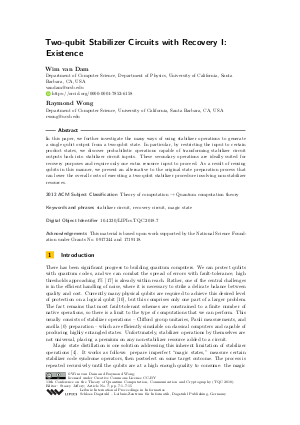Two-qubit Stabilizer Circuits with Recovery I: Existence
Authors
Wim van Dam  ,
Raymond Wong
,
Raymond Wong
-
Part of:
Volume:
13th Conference on the Theory of Quantum Computation, Communication and Cryptography (TQC 2018)
Part of: Series: Leibniz International Proceedings in Informatics (LIPIcs)
Part of: Conference: Conference on the Theory of Quantum Computation, Communication and Cryptography (TQC) - License:
 Creative Commons Attribution 3.0 Unported license
Creative Commons Attribution 3.0 Unported license
- Publication Date: 2018-07-16
File

PDF
LIPIcs.TQC.2018.7.pdf
- Filesize: 484 kB
- 15 pages
Document Identifiers
Subject Classification
ACM Subject Classification
- Theory of computation → Quantum computation theory
Keywords
- stabilizer circuit
- recovery circuit
- magic state
Metrics
- Access Statistics
-
Total Accesses (updated on a weekly basis)
0Document
0Metadata
Abstract
In this paper, we further investigate the many ways of using stabilizer operations to generate a single qubit output from a two-qubit state. In particular, by restricting the input to certain product states, we discover probabilistic operations capable of transforming stabilizer circuit outputs back into stabilizer circuit inputs. These secondary operations are ideally suited for recovery purposes and require only one extra resource input to proceed. As a result of reusing qubits in this manner, we present an alternative to the original state preparation process that can lower the overall costs of executing a two-qubit stabilizer procedure involving non-stabilizer resources.
Cite As Get BibTex
Wim van Dam and Raymond Wong. Two-qubit Stabilizer Circuits with Recovery I: Existence. In 13th Conference on the Theory of Quantum Computation, Communication and Cryptography (TQC 2018). Leibniz International Proceedings in Informatics (LIPIcs), Volume 111, pp. 7:1-7:15, Schloss Dagstuhl – Leibniz-Zentrum für Informatik (2018)
https://doi.org/10.4230/LIPIcs.TQC.2018.7
BibTex
@InProceedings{vandam_et_al:LIPIcs.TQC.2018.7,
author = {van Dam, Wim and Wong, Raymond},
title = {{Two-qubit Stabilizer Circuits with Recovery I: Existence}},
booktitle = {13th Conference on the Theory of Quantum Computation, Communication and Cryptography (TQC 2018)},
pages = {7:1--7:15},
series = {Leibniz International Proceedings in Informatics (LIPIcs)},
ISBN = {978-3-95977-080-4},
ISSN = {1868-8969},
year = {2018},
volume = {111},
editor = {Jeffery, Stacey},
publisher = {Schloss Dagstuhl -- Leibniz-Zentrum f{\"u}r Informatik},
address = {Dagstuhl, Germany},
URL = {https://drops.dagstuhl.de/entities/document/10.4230/LIPIcs.TQC.2018.7},
URN = {urn:nbn:de:0030-drops-92540},
doi = {10.4230/LIPIcs.TQC.2018.7},
annote = {Keywords: stabilizer circuit, recovery circuit, magic state}
}
Author Details
- Department of Computer Science, Department of Physics, University of California, Santa Barbara, CA, USA
References
- Alex Bocharov, Martin Roetteler, and Krysta M. Svore. Efficient synthesis of probabilistic quantum circuits with fallback. Phys. Rev. A, 91:052317, May 2015. URL: http://dx.doi.org/10.1103/PhysRevA.91.052317.
- Alex Bocharov, Martin Roetteler, and Krysta M. Svore. Efficient Synthesis of Universal Repeat-Until-Success Quantum Circuits. Phys. Rev. Lett., 114:080502, Feb 2015. URL: http://dx.doi.org/10.1103/PhysRevLett.114.080502.
- Sergey Bravyi and Jeongwan Haah. Magic-state distillation with low overhead. Phys. Rev. A, 86:052329, Nov 2012. URL: http://dx.doi.org/10.1103/PhysRevA.86.052329.
- Sergey Bravyi and Alexei Kitaev. Universal quantum computation with ideal clifford gates and noisy ancillas. Phys. Rev. A, 71:022316, Feb 2005. URL: http://dx.doi.org/10.1103/PhysRevA.71.022316.
- Earl T. Campbell and Mark Howard. Unified framework for magic state distillation and multiqubit gate synthesis with reduced resource cost. Phys. Rev. A, 95:022316, Feb 2017. URL: http://dx.doi.org/10.1103/PhysRevA.95.022316.
- Earl T. Campbell and Mark Howard. Unifying Gate Synthesis and Magic State Distillation. Phys. Rev. Lett., 118:060501, Feb 2017. URL: http://dx.doi.org/10.1103/PhysRevLett.118.060501.
- Earl T Campbell and Joe O’Gorman. An efficient magic state approach to small angle rotations. Quantum Science and Technology, 1(1):015007, 2016. URL: http://stacks.iop.org/2058-9565/1/i=1/a=015007.
- Guillaume Duclos-Cianci and David Poulin. Reducing the quantum-computing overhead with complex gate distillation. Phys. Rev. A, 91:042315, Apr 2015. URL: http://dx.doi.org/10.1103/PhysRevA.91.042315.
- Guillaume Duclos-Cianci and Krysta M. Svore. Distillation of nonstabilizer states for universal quantum computation. Phys. Rev. A, 88:042325, Oct 2013. URL: http://dx.doi.org/10.1103/PhysRevA.88.042325.
- Austin G. Fowler, Matteo Mariantoni, John M. Martinis, and Andrew N. Cleland. Surface codes: Towards practical large-scale quantum computation. Phys. Rev. A, 86:032324, Sep 2012. URL: http://dx.doi.org/10.1103/PhysRevA.86.032324.
- Brett Giles and Peter Selinger. Exact synthesis of multiqubit Clifford+T circuits. Phys. Rev. A, 87:032332, Mar 2013. URL: http://dx.doi.org/10.1103/PhysRevA.87.032332.
- Jeongwan Haah, Matthew B. Hastings, D. Poulin, and D. Wecker. Magic State Distillation with Low Space Overhead and Optimal Asymptotic Input Count. Quantum, 1:31, Oct 2017. URL: http://dx.doi.org/10.22331/q-2017-10-03-31.
- N Cody Jones, James D Whitfield, Peter L McMahon, Man-Hong Yung, Rodney Van Meter, Alán Aspuru-Guzik, and Yoshihisa Yamamoto. Faster quantum chemistry simulation on fault-tolerant quantum computers. New Journal of Physics, 14(11):115023, 2012. URL: http://stacks.iop.org/1367-2630/14/i=11/a=115023.
-
J.G. Kemény and J.L. Snell. Finite markov chains. University series in undergraduate mathematics. Springer-Verlag New York, 1976.

- Vadym Kliuchnikov, Dmitri Maslov, and Michele Mosca. Asymptotically Optimal Approximation of Single Qubit Unitaries by Clifford and T Circuits Using a Constant Number of Ancillary Qubits. Phys. Rev. Lett., 110:190502, May 2013. URL: http://dx.doi.org/10.1103/PhysRevLett.110.190502.
- Vadym Kliuchnikov, Dmitri Maslov, and Michele Mosca. Fast and efficient exact synthesis of single qubit unitaries generated by Clifford and T gates. Quantum Information and Computation, 13(7-8):607-630, 2013. URL: http://arxiv.org/abs/1206.5236.
- E. Knill. Quantum computing with realistically noisy devices. Nature, 434, Mar 2005. URL: http://dx.doi.org/10.1038/nature03350.
- Andrew J. Landahl and Chris Cesare. Complex instruction set computing architecture for performing accurate quantum Z rotations with less magic, Feb 2013. URL: http://arxiv.org/abs/1302.3240.
- Adam Meier, Bryan Eastin, and Emanuel Knill. Magic-state distillation with the four-qubit code. Quantum Information and Computation, 13:195-209, 2013. URL: http://arxiv.org/abs/1204.4221.
- Adam Paetznick and Krysta M. Svore. Repeat-Until-Success: Non-determistic decomposition of single-qubit unitaries. Quantum Info. Comput., 14(15-16):1277-1301, Nov 2014. URL: http://arxiv.org/abs/1311.1074.
- Ben Reichardt. Quantum universality by state distillation. Quantum Information and Computation, 9:1030-1052, 2009. URL: http://arxiv.org/abs/quant-ph/0608085v2.
- Neil J. Ross. Optimal ancilla-free Clifford+V approximation of z-rotations. Quantum Information and Computation, 15(11-12):932-950, 2015. URL: http://arxiv.org/abs/1409.4355.
- Neil J. Ross and Peter Selinger. Optimal ancilla-free Clifford+T approximation of z-rotations. Quantum Information and Computation, 16(11-12):901-953, 2016. URL: http://www.rintonpress.com/xxqic16/qic-16-1112/0901-0953.pdf.
